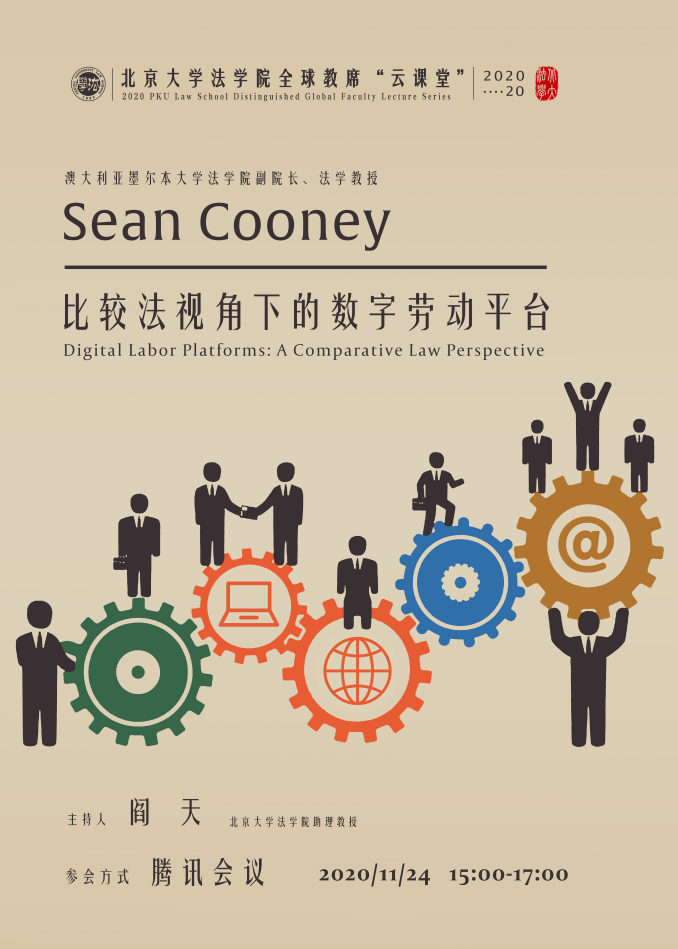全球教席“云课堂”20讲
题目:比较法视角下的数字劳动平台Digital Labor Platforms: A Comparative Law Perspective
时间:2020 年 11 月 24 日(周二)15:00-17:00
腾讯会议 ID:203 154 984
开讲学者:
Sean Cooney(澳大利亚墨尔本大学pg电子游戏官网官方网站副院长、法学教授)
主持人:
阎天(pg电子游戏官网官方网站助理教授)
开讲学者简介:
Sean Cooney 是澳大利亚墨尔本大学pg电子游戏官网官方网站副院长、法学教授,其研究领域涉及国际法、以亚洲为重点的比较劳动法和雇佣法。他致力于研究提高国际劳动标准的新方法,参与研究中国劳动法改革、澳大利亚劳工法的执行以及评估亚太地区国家法律变革影响的多个项目,并曾于美国、中国和澳大利亚的法律期刊上发表多篇学术文章。他于 2014 至 2016 年间作为专家在日内瓦国际劳工组织(ILO)劳动法与改革部门任职,为中国、印度、马来西亚、缅甸、巴基斯坦、越南等国政府提供建议,他目前仍为国际劳工组织提供咨询。他拥有墨尔本大学学士学位、哥伦比亚大学博士学位,并有劳动法和行政法领域的律师执业经历。
Sean Cooney is the Associate Dean and professor at Law School, University of Melbourne. Professor Cooney's research interests concern international and comparative labour and employment law, with a focus on Asia. He has worked on new approaches to improving international working standards, including on collaborative projects on understanding Chinese labour law reform, enforcement in Australia, and assessing the effect of legal change in several Asia-Pacific countries. He has published articles in major refereed law journals in the United States, China and Australia. Between 2014 and 2016, Sean served as a Legal Specialist in the Labour Law and Reform Unit at the International Labour Organization (ILO) in Geneva, where he provided advice to governments in countries such as China, India, Malaysia, Myanmar, Pakistan and Vietnam. He continues to consult for the ILO. He studied at the University of Melbourne and obtained his doctoral degree from Columbia University and also spent several years as a lawyer practicing mainly in the areas of employment and administrative law.
讲座摘要:
数字劳动平台已在全球范围内得到了广泛应用,它们包括:为交通运输提供定位服务的平台(比如:优步、Grab 和滴滴出行),为外卖业务提供定位服务的平台(比如:户户送、Glovo 和美团),以及为自由职业、编程、零工等业务提供网页服务的群众外包平台。
如何规制劳动者和平台的关系?这个问题在全球范围内一直存在着各种争议。世界各地的立法机构、法院和其他监管机构都在试图解决社会保障、工作安全(特别是在新冠疫情期间)、集体谈判、数据保护、算法管理、争端解决等各种问题。
在一些法域,立法者和法官认为这些数字劳动平台与劳动者之间存在劳动关系(比如:法国、西班牙和美国加州)。另一些法域则采用了更为折衷的立场(比如:英国、加拿大)。而在一些国家,数字劳动平台工作的劳动者只享有某些劳动者权利(比如:澳大利亚、中国)。
本次讲座的内容基于由开讲学者参与合著的且即将发布的一份重要国际劳工组织报告。该报告的起草综合了对全球多个行业约 1.2 万名劳动者和 80 位企业受访者的广泛调查,第一次较为完整地描绘了平台商业运行模式和在各种数字劳动平台上开展业务的企业和劳动者的实践图景。
The use of digital labour platforms has become widespread around the globe. They include location-based platforms for transportation (such as Uber, Grab and DiDi) and delivery (such as Deliveroo, Glovo and Meituan) as well as web-based platforms for freelancing, programming and microtasking.
The regulation of the relationship between workers and the platforms has been controversial around the world. Questions of social security, work safety (especially during the pandemic), collective bargaining, data protection, algorithmic management, dispute resolution and so on are being addressed by legislatures, courts and other institutions across six continents.
In some jurisdictions, law-makers and judges have construed an employment relationship between the platforms and their workers (for example France, Spain and until recently California). Other jurisdictions have opted for an intermediate category (United Kingdom, Canada). In some countries, some worker rights appear to apply to platform workers but not others (Australia, China).
This lecture is based on a major forthcoming ILO report, of which I am a co-author that explores these issues. The report draws on surveys conducted among about 12,000 workers and 80 business respondents across the world in multiple sectors. It provides a first major comprehensive picture of platform business models, as well as the experiences of workers and businesses on online web-based and location-based platforms.

对外事务办公室
2020年11月17日
